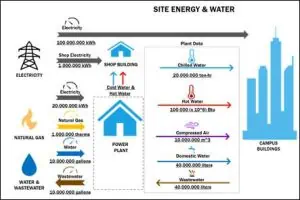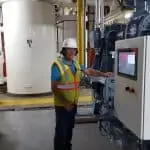

Energy costs are becoming more important to your bottom line due to inflation, energy shortages/increased global demand, tightening environmental regulations, growing corporate sustainability goals, and climate change challenges. Those companies with an effective energy management program that have reduced energy costs and reinvested savings in new energy projects could have a considerable competitive advantage.
An energy management program supported by owners, management, operators, and staff is more likely to select efficient choices that minimize life-cycle cost, provide a return on investment (ROI), and maximize profits. SCS has mechanical, electrical, industrial, and environmental energy professionals nationwide who understand how to achieve more efficient production using electricity, conventional/renewable fuels, and water in industries.
Specifically, SCS has over 100 years of cumulative ammonia refrigeration experience regarding operations, design, maintenance, compliance, energy audits, commissioning and retro-commissioning, system assessments, energy modeling, equipment selection, and control systems.
The following steps illustrate a tiered approach to energy management for ammonia refrigeration facilities:
Onsite Energy Audit
SCS professionals with decades of experience working with refrigeration and energy-consuming systems conduct the onsite audit. The visit includes working with the facility staff to evaluate day-to-day operations; learn about the state of equipment and plans for changes; obtain energy use and utility cost data; gain insight into energy demands and controls systems; and conduct a plant walkthrough. During the walkthrough, SCS may use portable data loggers, infrared thermal imaging, or other tools to supplement staff knowledge to help quantify energy conservation measures.
Findings Report
The main deliverable of the onsite audit is the audit report. SCS provides a detailed audit report with our findings, observations, and possible system modifications. These could include but are not limited to pressure adjustments, equipment additions/alterations, control systems, operation schedule modifications, etc.
Engineering Report
Follow-up steps may involve detailed engineering recommendations for implementation. These can include evaluating and selecting alternative equipment, systems, and controls; calculating future energy consumption, costs, and savings; and checking to verify that changes do not create negative side effects.
Training
SCS supports the implementation phase of the findings by providing operator training. Training is key ─ operators then understand what changes to expect and why. Operator “buy-in” is a key element for the long-term sustainability of energy management programs.
Rebates & Incentives
To improve a project’s ROI, facility personnel should take advantage of local and federal incentives. SCS can help coordinate with the local utility to determine if the facility can use rebate programs and provide calculations to support estimated energy savings.

SCS helps our clients make sustainable energy management plans and sound investment decisions based on objective energy audits, assessments, and energy modeling. If you’d like to learn more about our facility energy management capabilities, visit our website or contact us at .
About our Authors:

